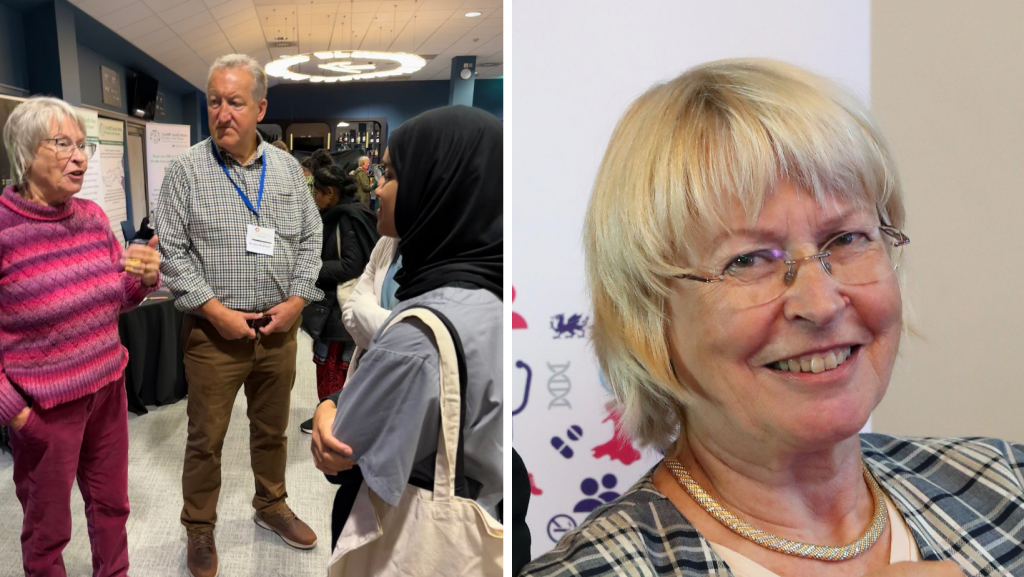
Before I retired, I had given some thoughts as to all the things I was going to do when I no longer had to work 5 days a week as the Deputy Director of the Cardiff University Careers and Employability Centre. Various hobbies came to mind – hill walking, as a keen member of the ramblers, gardening, nice holidays….and not having to get up at 6.15am every morning to beat the morning rush hour! Public Involvement in research wasn’t on my list at that stage.
The week I retired, I started to be unwell for a few days at a time, then okay for a few days. This resulted 3 months later in a diagnosis of Stage 3 bowel cancer, which changed everything. Six months later, finishing chemotherapy I revisited thoughts about what to do in retirement and stumbled across Public Involvement through the National Institute for Health and Care Research (NIHR), and then realised we had our very own Public Involvement community in Wales through Health and Care Research Wales. Having had cancer treatment, and also having a lifelong interest in medical science through my degree in Physiology (which was never actually used in a science research job), I thought that being a patient representative in medical research was something which would interest me.
I started applying for positions through the HCRW Public Involvement Bulletin and joined the Public Involvement Community, but it took a while for me to be accepted on my first Trial Management Group. The meetings were all face to face then which did give an opportunity to meet real people and get to know them. Now that most meetings are all online, I think that makes it more difficult to build those relationships especially for someone new to the role. Now, I’m happy to have most meetings online which is a greener approach and means a lot fewer hours on the M4 travelling for me.
Most of my work revolves around bowel cancer, which is where my lived experience lies, and which has involved three immediate family members – my mother who died of it at 91, myself and my daughter, both survivors who had it at 59 and 35. Understandably, since both my daughter and I had not had bowel screening tests (my first one arriving four weeks after surgery), I am passionate about early diagnosis and screening for cancer.
As well as sitting on several trial management groups, I was also a member of the NICE Colorectal Guideline Committee which reported in 2020. For me personally, two especially important results came out of this. One was the reduction of the time necessary for adjuvant chemotherapy for bowel cancer from eight cycles down to four which considerably reduces the number of patients developing oxaliplatin related chronic peripheral neuropathy (which I have). The second was the research call which was put out for more research on LARS (bowel problems caused by low anterior resection surgery) In a fortuitous move, the research funding for this was awarded to Julie Cornish, a consultant I had previously worked with and who now leads the POLARiS trial into treatments for this condition. I am now a co-applicant on this trial which has just started.
So, what do I get from taking part as a public member in medical research? I find the whole topic of medical research into cancer interesting and my medical subject knowledge, whilst not a requirement for public involvement work, is helpful when it comes to understanding some of the terminology used. I also feel that I am doing something very useful with my time. Hobbies are all very well, but they can’t fill all your time in retirement!
I really enjoy what I do and appreciate the new friendships I have developed over the last few years, which can be another thing harder to do when you retire.
As well as the bread-and-butter activities of looking at lay summaries and patient information sheets which PPI undertake, there are also opportunities, for those who are interested, to look at issues relating to strategies and governance of medical research. These are issues I have become deeply involved in through my role as Lay Lead Research partner for the Wales Cancer Research Centre (WCRC). I must admit sometimes I’ve found it challenging to talk at conferences or represent a research group at a high-level funding meeting, but the satisfaction afterwards does outweigh the anxiety leading up to such activities!
But people shouldn’t be put off public involvement if these sorts of activities don’t appeal to them. The range and level of opportunities is very varied, people can choose how they want to become involved.
The best way to find out what is available is by signing up to the Health and Care Research Wales weekly bulletin which lists regular opportunities.